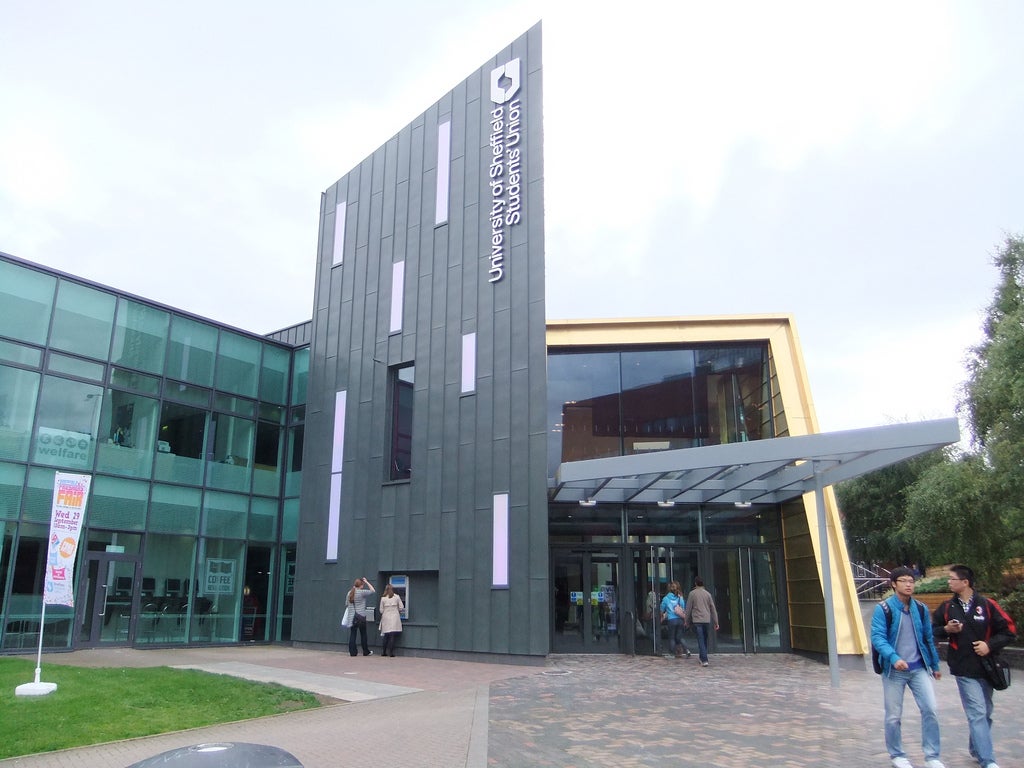Sheffield Students’ Union votes to sabotage NSS in the wake of Government’s White Paper
Students want to find alternative ways to give feedback on courses without using NSS metrics which could leave younger generations in 'a lifetime of even more debt'

Your support helps us to tell the story
From reproductive rights to climate change to Big Tech, The Independent is on the ground when the story is developing. Whether it's investigating the financials of Elon Musk's pro-Trump PAC or producing our latest documentary, 'The A Word', which shines a light on the American women fighting for reproductive rights, we know how important it is to parse out the facts from the messaging.
At such a critical moment in US history, we need reporters on the ground. Your donation allows us to keep sending journalists to speak to both sides of the story.
The Independent is trusted by Americans across the entire political spectrum. And unlike many other quality news outlets, we choose not to lock Americans out of our reporting and analysis with paywalls. We believe quality journalism should be available to everyone, paid for by those who can afford it.
Your support makes all the difference.The students’ union at Sheffield University (SSU) has joined in the campaign to sabotage the National Student Survey (NSS) in order to stop the Government from raising tuition fees even higher.
SSU - which was named the UK’s best students’ union by the NSS for the fourth year in a row - said it wants to find alternative ways for students to give feedback on their courses, without using the metrics, which could leave younger generations in “a lifetime of even more debt.”
The move has come following the publication of the Government’s White Paper on Monday which announced that a series of new measures would be introduced to improve teaching in universities which could result in higher tuition fees.
Institutions that score highly for teaching quality from surveys like the NSS and the Destination of Leavers in Higher Education (DLHE) survey will be able to raise the annual fee amount beyond the current maximum of £9,000.
The NSS is a high-profile annual census of nearly half a million students across the UK from which statistics and data are taken to measure the quality of teaching in higher education as part of the Government’s Teaching Excellence Framework (TEF) initiative.
Minesh Parekh, SSU education officer who proposed the sabotage policy, described the proposals - including those from the Green Paper last November - as being “incredibly ideological.”
He said: “They wish to see students reduced to ‘consumers’ who are simply buying a product - a degree - solely as a means to a ‘better’ job and nothing more. This ‘understanding’ of education is utterly warped: education isn’t something we can just buy, and learning doesn’t stop once we leave university.
“Higher education in the UK is currently at a crossroads. If the Government’s reforms succeed, we are faced with the prospect of higher fees, less transparency, and an education which is ‘satisfying’ or ‘nice’ rather than challenging, inspiring, and liberating.
“All we have left is to play the government at their own game, and strike at the heart of their plans.”
Alice Day, SSU’s upcoming education officer from July, said that, by sabotaging the NSS, students have “a real opportunity” to show the Government they are serious. She said: “The Government has claimed on numerous occasions it wants to put students at the heart of the system. The TEF won’t do that. In fact, it will do the opposite. Therefore, we have to do whatever we can to oppose it and, by sabotaging the NSS, we can achieve that.”
The move also has the support of the National Union of Students (NUS) which passed a motion at its National Conference in Brighton last month, encouraging students and graduates to either boycott the NSS and DLHE survey - or sabotage them by giving artificially maximum or minimum scores - believing this could “render the TEF unworkable, and seriously disrupt the government’s HE reforms as a whole.”
The University and College Union (UCU) - which SSU said it would work with to find other ways for students to get their course views across - has also commented on the White Paper.
UCU general secretary Sally Hunt said: “We remain deeply concerned by any proposed link between quality as defined in the TEF and additional income, and will oppose any move to further increase the lifetime cost of higher education, which already sits at over £50,000 for the poorest undergraduates.”
Protesters part of the National Campaign Against Fees and Cuts (NCAFC) movement have criticised the way the surveys will be used and said that scoring well in the TEF would increase the cost of education and create further competition in a tiered system between different universities.
NCAFC added: “If these proposals go through, they will radically transform our education for the worse.”
Commenting on the White Paper’s release, Universities Minister, Jo Johnson, said the UK’s institutions are “engines of economic growth and social mobility,” adding: “If we are to remain competitive and ensure a high-quality education remains open to all, we cannot stand still.
“Making it easier for high-quality challenger institutions to start offering their own degrees will help drive up teaching quality, boost the economy and extend aspiration and life chances for students from all backgrounds.”
Join our commenting forum
Join thought-provoking conversations, follow other Independent readers and see their replies
Comments